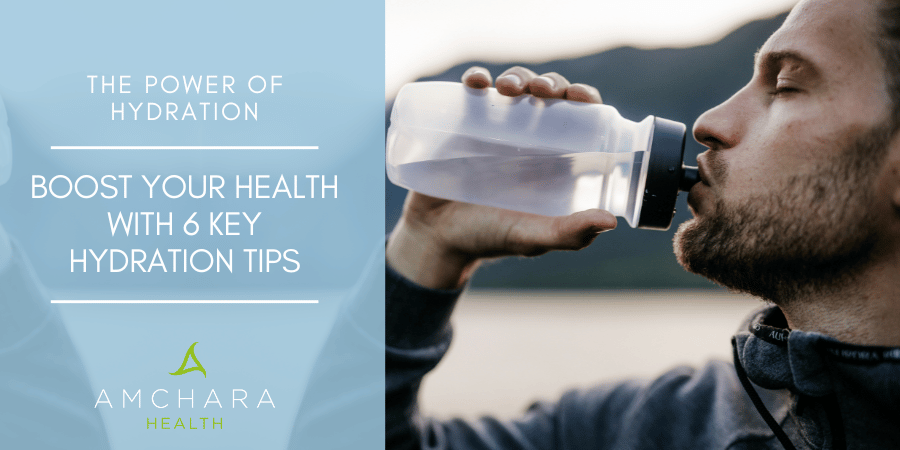Topics Covered in this article:
Maintaining adequate hydration is absolutely crucial to support almost every aspect of overall health and wellbeing. Hydration has a profound impact on our physical, mental and emotional health. When we are dehydrated, our bodies lack adequate fluid to support normal, and critical, physiological functions.
In the modern internet world there is an overwhelming amount of often misinformation. That’s why our articles are always evidence-based and orientated towards a holistic and Personalised Health approach, to provide you with actionable knowledge and tips to help you on your journey to optimal health.
In this article we’ll take a closer look at what happens when you are dehydrated, and key reasons why it is so important to keep well hydrated to boost your body’s ability to function optimally. We also share some tips to help you keep hydrated and so increase your overall health and wellbeing.
What happens when you are dehydrated?
Dehydration can be caused by a number of reasons such as inadequate water intake, vomiting, diarrhoea, and excessive sweating. Severe dehydration can be life-threatening, as it can lead to organ failure and other serious health complications.
When we are dehydrated, our bodies lack adequate fluid to support normal physiological functions, and a number of symptoms can occur – initially the body’s warning system that hydration is needed.
11 symptoms of dehydration
- 1
Thirst: typically the first response to dehydration, thirst is the body’s initial trigger to encourage and stimulate a response to take in fluids.
- 2
Dry mouth and lips: if the body is dehydrated, saliva production is reduced, resulting in dryness.
- 3
Reduced urine output: decreased urine output or production of dark urine because the body is trying to retain fluids.
- 4
Lack of energy and fatigue: feelings of tiredness and weakness will happen as the body doesn’t have enough energy to perform normal activities.
- 5
Dizziness: blood pressure can drop with dehydration, causing lightheadedness and dizziness.
- 6
Headaches: some research indicates that headaches can be caused as a result of dehydration, and it is also thought dehydration may be a trigger for headaches related to other conditions, such as migraine.
- 7
Dry skin: dehydration can result in a lack of elasticity, causing dryness and a propensity to irritation in the skin.
- 8
Rapid heartbeat: the body starts to try to compensate for reduced blood volume by increasing heart and breathing rates.
- 9
Confusion: difficulty concentrating, confusion and irritability can be caused by cognitive function being affected.
- 10
Electrolyte imbalance: the balance of vital electrolytes including sodium, chloride and potassium can be disrupted resulting in potential complications such as muscle weakness and cramps, and irregular heartbeat.
- 11
Heatstroke: dehydration increases the risk of heat-related illnesses, such as heatstroke and heat exhaustion.
13 key reasons to keep hydrated
- 1
Digestion and nutrient absorption: adequate hydration enables the proper functioning of the digestive system, aiding in breaking food down and effective absorption of nutrients, enabling the body to utilise essential vitamins, minerals and other nutrients. Water also ensures the efficient movement of waste products and toxins through the digestive tract. This is vital to enable proper functioning of the organs and preventing accumulation of harmful substances.
- 2
Cognitive function: brain function is impaired through dehydration and cognitive abilities such as concentration, memory and attention can be affected, resulting in reduced mental clarity, performance, negatively impacting mood and emotional wellbeing, and increasing the likelihood of stress and anxiety.
- 3
Temperature regulation: water aids the regulation of body temperature through the production of sweat and consequent evaporation, acting as a coolant and preventing overheating, a particularly important mechanism when the body needs to adapt to environmental temperature changes.
- 4
Kidney and liver function: these important organs are crucial in effecting the filtering and flushing out of waste and toxins. Sufficient water enables them to function effectively, detoxifying and purifying the bloodstream, and ensuring oxygen and vital nutrients are delivered effectively to cells and tissues throughout the body.
- 5
Skin health: water is an important contributor to maintaining healthy skin through keeping it moisturised, reducing the risk of dryness and other skin conditions such as acne, and promoting a healthy complexion.
- 6
Joint and cartilage health: the lubrication of joints and cartilage maintenance requires adequate hydration, reducing friction and allowing smooth movement, essential for effective mobility and the prevention joint stiffness, discomfort, and other joint-related issues.
- 7
Shock absorption: water creates an essential cushioning to the body’s tissues and organs, helping to protect against impact and shock, and so safeguarding vital body structures.
- 8
Cell function: the primary component of cells, water is essential for almost all cellular processes, such as nutrient support, energy production, and waste removal.
- 9
Metabolism support: breakdown of food and energy release are important metabolic processes which staying hydrated ensures can be carried out efficiently.
- 10
Heart health: increased heart rate and decreased blood volume can be caused by dehydration putting additional stress on the heart. Overall cardiovascular health is supported through adequate hydration.
- 11
Immune function: water helps transport immune cells and antibodies throughout the body, therefore assisting with the effective functioning of the immune system in fighting against infection and disease.
- 12
Weight management: a feeling of fullness is promoted by staying hydrated, which can aid weight management in reducing calorie intake and supporting the metabolism. Thirst can be mistaken for hunger, leading to unnecessary calorie consumption.
- 13
Energy levels: dehydration is likely to result in fatigue and reduced energy. Adequate promotion will help maintain energy levels, and increase the ability to be alert, focused and productive.
6 tips to keep hydrated
- 1
Drink water first thing in the morning: a great way to start the day, giving your metabolism a boost and contributing to increased energy levels.
- 2
Regularly drink water: carry a reusable bottle of water with you when you’re on the go, and sip frequently throughout the day.
- 3
Add flavour: If you don’t enjoy the taste of water, try adding a slice of lemon or ginger to it, or experiment with herbs such as mint.
- 4
Drink water before eating: drinking a glass of water before a meal will help you digest your food more efficiently and help you feel full more quickly.
- 5
Electrolyte drinks: if you are already dehydrated, electrolyte solution drinks can help the body to quickly replenish lost minerals and rebalance the electrolytes in the body.
- 6
Limit caffeine and alcohol: these have a diuretic effect on the body, meaning they will promote water loss through urine, by inhibiting the production of the hormone vasopressin, involved in the regulation of water excretion.
Takeaway
Be mindful that individual hydration requirements are varied, depending on factors such as overall health status, age, activity level, climate and age. So there is no one size fits all answer as to how much water is the right amount to drink – a general recommendation is to prioritise drinking water regularly throughout the day to maintain optimal hydration levels.
As well as preventing dehydration, hydration impacts every aspect of health, from physical performance and effective digestion, through to heart and brain health, mental clarity and emotional balance.
At Amchara, we always aim to guide you through evidence and scientific research. Come to our nurturing environment at Amchara, where our experienced Personalised Health practitioners can work with you to explore positive lifestyle choices to help you achieve your health goals, with a tailored approach taking into account your individual circumstances. Employing a functional medicine approach, our practitioners can support you throughout your stay with us and encourage you to make sustainable lifestyle choices both on retreat and when you return home.
Juicing and fasting may be recommended on retreat, according to your individual status and unique health needs and you will be immersed in a supportive environment that enables you to switch off, relax and kickstart your health journey, including physical activities and empowering, educational talks.
Or why not try Amchara Juicery – cold-pressed, nutritious juices delivered to your door to help you boost your health, naturally. Created by Amchara’s expert in-house health team, you can enjoy a range of fresh, organic juice cleanses (and super soups) at home.




